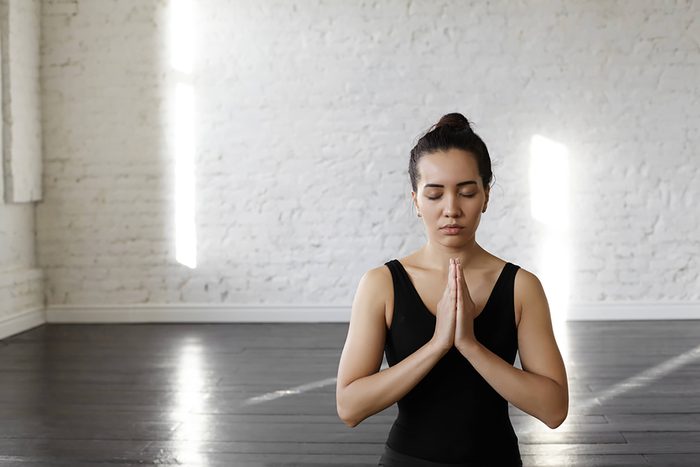
Say “aaaahhh”
True relaxation requires a shift from a stress-based outlook of fight or flight to one that Melanie St. Ours, a professional herbalist and author of The Simple Guide to Natural Health, describes as “rest and digest.” “Each of these conditions of the nervous system has a profound effect on our thinking, feeling, heart and lungs, immune system, digestive system, and more.” Need better sleep? Try these 10 relaxation techniques that can really help you wind down.

Your levels of a harmful hormone decline
“Relaxation can help reduce the stress hormone known as cortisol,” says fitness expert Matt Weik, owner of Weik Fitness in Wernersville, Pennsylvania. “The job of cortisol is to help your body deal with various stressful situations. When cortisol levels remain elevated for a long period of time, it can cause high blood pressure. High levels of cortisol can disrupt sleep cycles, create negative mood patterns, zap your energy, and even cause you to store body fat. When you relax and cortisol levels have a chance to normalize, you have a better chance to minimize the negative effects and improve your overall health and well-being.” Here are some healthy ways to unwind that don’t involve booze.

Your autopilot goes off high alert
Ongoing scientific research is exploring more of relaxation’s benefits; James Webb, MD, based in Tulsa, Oklahoma, points to some facts about our physiological well-being that are already quite clear. “Relaxation generally uses our conscious mind and somatic nervous system to achieve subconscious changes in the autonomic nervous system (ANS),” he explains. The ANS controls heart rate, breathing rate, blood pressure, and the ebb and flow of hormones like adrenaline, Dr. Webb says. When you consciously relax, your ANS slows in response. If you’re trying to unwind, avoid these 10 popular de-stressors that can actually backfire.

Your heart rate drops
Relaxation techniques help shift that underlying activity in the autonomic nervous system from the adrenaline-laden fight-or-flight side to the aforementioned rest-and-digest part of your nervous system. “This has a variety of effects, from slowing heart rates and decreasing blood pressure to putting us ‘at ease’ and promoting a positive sense of well-being,” says Dr. Webb. “This makes our conscious activity more effective, including increased concentration and decreased anxiety.”

Your focus will improve
It may seem counterproductive to take time out for relaxation, since that pile of work isn’t going to do itself. However, Caleb Backe, a health and wellness expert for Maple Holistics, makes a case for giving yourself a time-out. “Simply put, when you are stressed, your body needs to use extra energy in order to fuel your fight-or-flight response,” he explains. “This will result in anxiety and lack of focus, since all of your body and mind’s energy is being used to defend you from the imaginary horde of lions coming your way. Relaxing will return your body to balance and get rid of the unnecessary adrenaline, which means you’ll have more energy, physically and mentally.” Learn these 12 signs you’re more stressed than you realize.

You’ll gain clarity
“Deep relaxation shuts down overactive brain waves,” says Sal Raichbach, PsyD, of Ambrosia Treatment Center. He explains that although these high-frequency brain waves serve a purpose in communication and problem solving, balancing brain waves is key. “Stress chemicals like cortisol and adrenaline disrupt this balance. Deep relaxation allows you to regulate the brain to end in a calm, stable state of mind, even when you are no longer actively relaxing,” says Raichbach. Try these 15 tension tamers to shut down stress in five minutes.

You’ll feel warmer
A common sign of anxiety is cold or clammy hands. Urszula Klich, PhD, a clinical psychologist who specializes in biofeedback, explains why: “The vessels in your hands and feet have constricted, sending blood flow to your vital organs, heart, and brain,” she says. “Many people, especially women, find their hands are perpetually cold, which is the body’s sign that they are stressed and need to relax.” Take a time-out for a quick meditation—which can be as short as three minutes—by closing your eyes, breathing slowly and deeply, and allow your blood flow to return to normal.

Healing kicks in
De-stressing is a form of restoring the body, says Klich. In regulating hormones and balancing brain waves, the goal is to return your body’s baseline to one of restoration and healing. Engaging these parts of the brain takes practice, and biofeedback therapy can be beneficial. The Mayo Clinic defines biofeedback as techniques you can use to learn to control your body’s functions, like heart-rate variability training (learning to control your heart rate) and peripheral temperature control (learning to control the vasodilation or constriction of vessels). Check out these 8 weird symptoms that are linked to stress.

Your immunity may dip
If you’ve just been through an incredibly stressful time and you’ve come out on the other side, you may feel as if you’ve been hit by a truck. Psychologist Marc Schoen, PhD, refers to this as the “letdown effect.” Essentially, your body protects you during stressful times by boosting its immune response. When the stress lifts, he says, the body can undergo rapid changes that weaken the immune system, leaving you “vulnerable to illness or physical symptoms, such as headaches, stomach disorders, panic attacks, and other pain reactions.”

You’ll detoxify
Meditation expert and author Patt Lind-Kyle believes that releasing your tension and anxiety trains your mind to let go of the busy resistances of daily life and to learn to just be in the moment. When we “let go,” so to speak, a number of things happen, including a deepening of breathing, which reduces carbon dioxide levels that can cause acidosis (an excessively acidic condition of the body fluids or tissues). Research indicates that regular meditators also undergo positive changes in the structure and function of the brain. Not all stress is bad, however; read about these 9 surprising ways stress can benefit you.

Your brain waves may change for the better
A 2010 study suggests that meditating yields more changes in electrical brain wave activity—changes that are associated with a greater “wakeful, relaxed attention”—than simply trying to rest. Researchers found that during meditation, theta waves were abundant in the frontal and middle parts of the brain. “These types of waves likely originate from a relaxed attention that monitors our inner experiences,” study author Jim Lagopoulos, PhD, a professor at the University of Sydney, said in a press release. Check out these 11 healthy ways to de-stress with food.
